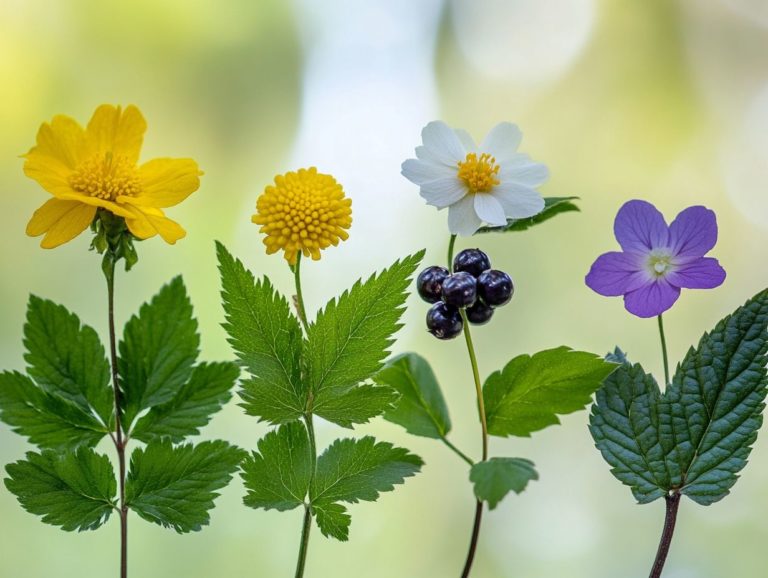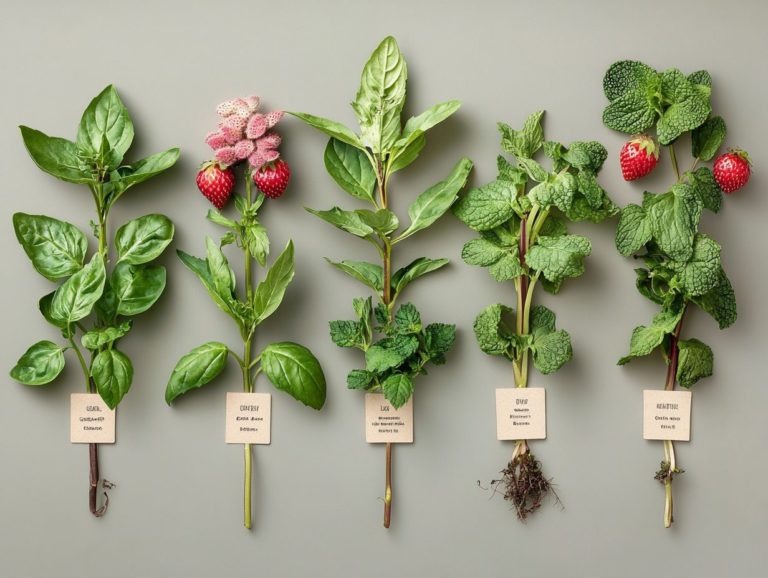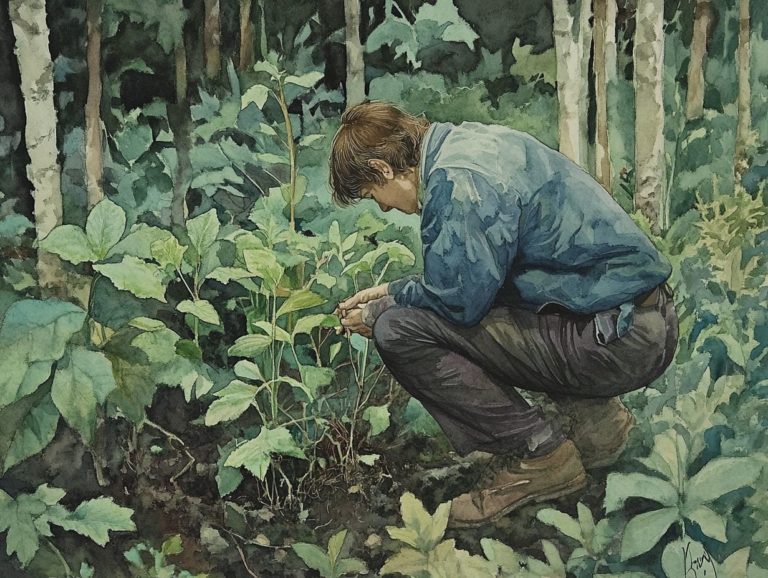The Best Apps for Plant Identification
In a world full of colorful plants, identifying a new green companion can spark both excitement and a touch of challenge.
Fortunately, technology has transformed this process into something remarkably accessible, thanks to a plethora of plant identification apps. Whether you’re a casual enthusiast or a seasoned gardener, these tools provide swift and precise identification, gardening tips, and a host of additional resources.
This article delves into the top 10 plant identification apps that will empower you to unlock the secrets of nature. You ll find insights into their distinctive features and benefits. Whether you seek accuracy, intuitive interfaces, or supplemental plant care guidance, there’s something tailored just for you.
Discover how these apps can transform your botanical adventures!
Contents
- Key Takeaways:
- 1. PlantSnap
- 2. PictureThis
- 3. PlantNet
- 4. iNaturalist
- 5. Garden Answers Plant Identifier
- 6. SmartPlant
- 7. Leafsnap
- 8. Pl@ntNet
- 9. NatureGate
- 10. Plantifier
- What to Look for in a Plant Identification App?
- How Accurate Are These Apps?
- Do They Work for All Types of Plants?
- Are There Any Free Options Available?
- What Are the Additional Features of These Apps?
- How Can These Apps Help with Plant Care?
- Are There Any Limitations to These Apps?
- How Can Users Contribute to the App’s Database?
- What Are the Privacy and Security Concerns with These Apps?
- Are There Any Similar Apps for Animal Identification?
- Frequently Asked Questions
Key Takeaways:
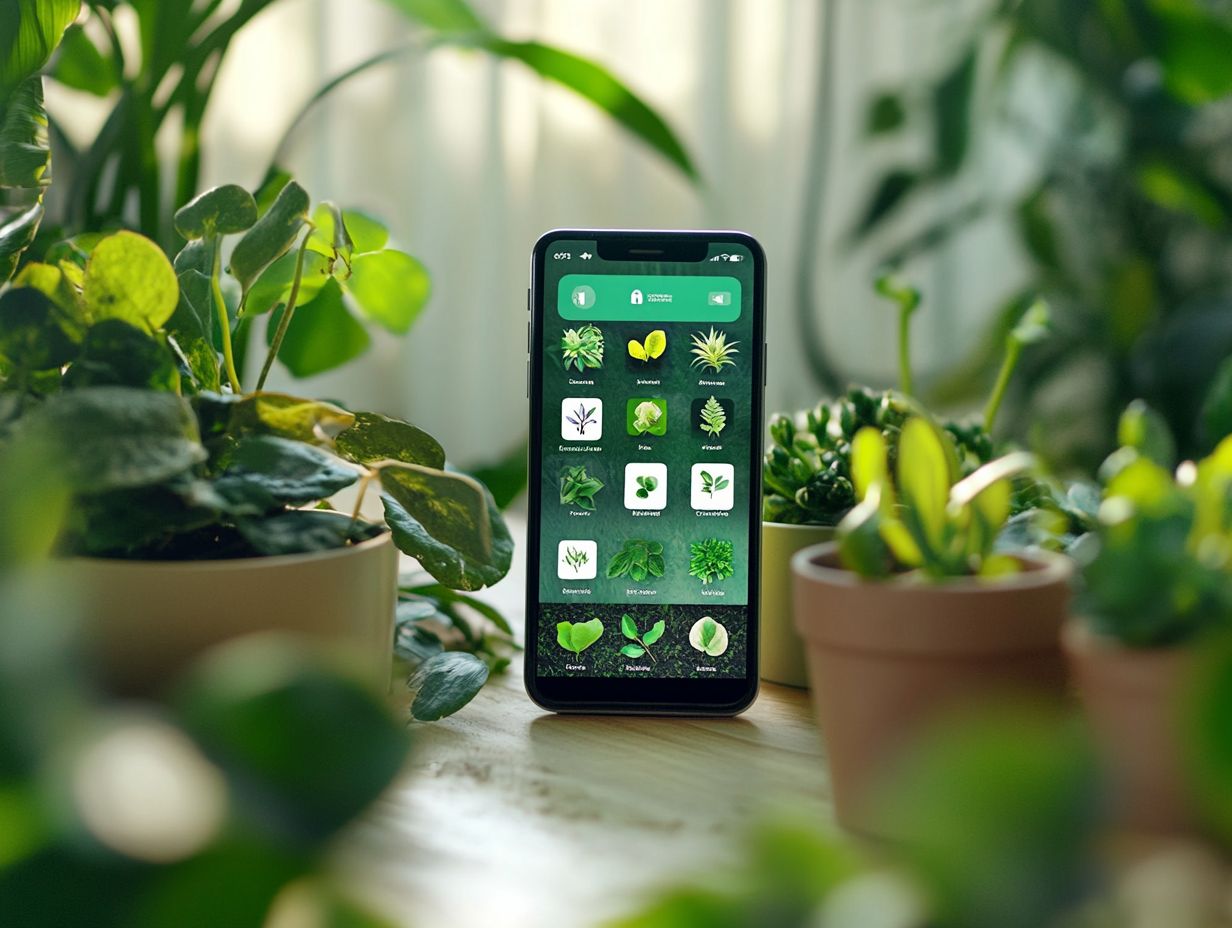
- Plant identification apps are useful tools for accurately identifying plants.
- These apps often have additional features, such as plant care tips, and allow users to contribute to their databases.
- It’s important to consider accuracy, plant variety, cost, and privacy when choosing a plant identification app.
1. PlantSnap
PlantSnap is a game-changing mobile app tailored for effortless and precise plant identification. It is an essential companion for everyone from casual gardeners to seasoned naturalists eager to explore the rich tapestry of botanical diversity around them.
Using advanced photo recognition technology, PlantSnap invites you to share your discoveries and experiences. This nurtures a profound connection with nature and advances education through citizen science, which is when regular people contribute to scientific research.
The app stands out due to its expansive database, featuring over 600,000 plant species. Whether you re meandering through an urban park or hiking across a rural landscape, you ll find immense satisfaction in uncovering new flora.
The app s community engagement features allow you to connect with others, ask questions, and share insights. This enriches your overall experience. User reviews frequently emphasize how PlantSnap elevates their outdoor adventures, turning simple strolls into enlightening explorations while equipping any green-thumb enthusiast with invaluable knowledge.
2. PictureThis
PictureThis provides you with a powerful plant identification app that combines advanced features with a sleek interface. This ensures you can quickly and accurately identify a wide variety of plant species.
With its impressive image recognition capabilities, you can simply snap a photo of a plant and receive immediate results. This demonstrates its accuracy in identifying hundreds of thousands of species. PictureThis incorporates a robust user feedback system, allowing you and the community to contribute insights and refine the results even further.
While other alternatives might boast broader gardening features, PictureThis shines with its focused approach to plant identification. You won t feel overwhelmed by unnecessary options. Its community-driven aspect builds a community of shared knowledge, greatly improving your experience.
3. PlantNet
PlantNet truly shines in the world of plant identification apps, primarily because of its commitment to community contributions and educational resources. It s no wonder it s a go-to for naturalists and gardening aficionados like you.
This innovative platform encourages you to share your own plant observations, significantly enhancing its rich database. With each entry you submit, the collective knowledge expands, nurturing a vibrant community of fellow botany enthusiasts.
PlantNet also provides an array of educational tools tailored to deepen your understanding of various species. From interactive guides to detailed descriptions and stunning images, these resources aid in accurate identification and cultivate a greater appreciation for the diversity and ecology of plants. For anyone eager to broaden their botanical knowledge, this app is a critical companion.
4. iNaturalist
iNaturalist is an extraordinary platform tailored for community-based science, enabling you to document your observations of plants and wildlife. This enriches the collective understanding of biodiversity.
The app maps your discoveries and cultivates a vibrant community where gardening enthusiasts like you can share findings and expertise. You can connect with seasoned naturalists who provide valuable insights and assist in species identification.
Moreover, the app encourages your involvement in local conservation projects. You can collaborate with initiatives focused on habitat preservation and species protection.
For instance, through organized bioblitz events community gatherings where many people work together to find as many species as possible in a specific area you can participate in collaborative research efforts.
This fosters a sense of unity while making meaningful contributions to ecological studies.
5. Garden Answers Plant Identifier
Garden Answers Plant Identifier is an essential tool for you as a gardener. It offers swift and precise identification of plants while providing expert support to guide you through your gardening journey.
More than just identification, this app connects you to a treasure trove of resources and valuable information tailored to your specific gardening needs. With its unique Q&A feature, you can easily pose questions and receive prompt answers from seasoned horticulturists.
This ensures you approach any gardening challenge with confidence, whether you re nurturing your very first plant or managing a sprawling garden.
The app enables you to make informed decisions, elevating your overall gardening experience and deepening your passion for nature.
6. SmartPlant
SmartPlant combines plant identification with essential gardening tools, creating an all-in-one mobile app that helps you identify and care for your plants effectively.
This app boasts features designed to elevate your gardening experience. With reminders for watering, fertilizing, and repotting, you can ensure your plants receive the attention they need to flourish.
You ll also gain access to expert tips tailored to specific plant types, enabling you whether you re a novice or a seasoned gardener.
Many users share enthusiastic testimonials about how SmartPlant has transformed their gardening journeys. One user noted how it revitalized her previously struggling houseplants into stunning displays, while another praised the app for helping him track his thriving garden.
With such glowing feedback, this multifaceted tool clearly enriches the art of gardening.
7. Leafsnap
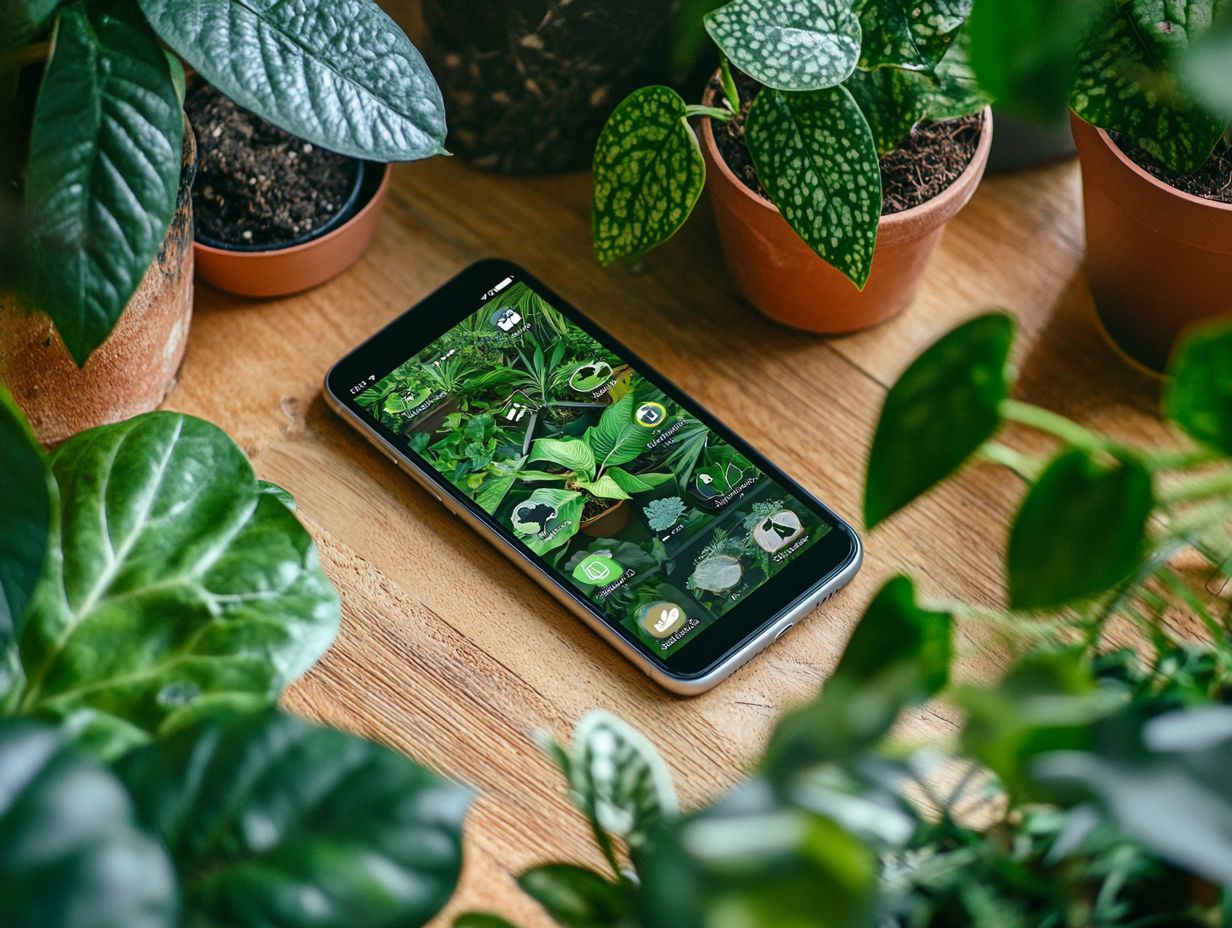
Leafsnap is your go-to plant identification app, designed to captivate with high-quality photos and cutting-edge technology, making the identification of various plant species effortless.
With a strong emphasis on visual data, this app caters to naturalists who appreciate the intricate details of leaves, flowers, and bark for accurate recognition.
Leafsnap fosters a dynamic community where you can connect with fellow enthusiasts, sharing observations and insights in a collaborative space dedicated to identification.
By uploading your own photos and findings, you contribute to a rich collective database, fostering a culture of learning and discovery.
This exciting blend of technology and community makes Leafsnap more than just an app; it connects you with nature.
8. Pl@ntNet
Pl@ntNet serves as a dynamic resource for plant enthusiasts like you. It blends a user-friendly interface with a vibrant community platform, making plant identification and education a breeze.
This innovative app invites you to observe and contribute to a collective database while deepening your understanding of biodiversity’s crucial role in our ecosystems. By sharing your findings and learning from others, you re inspired to embrace sustainable practices.
The app offers valuable insights into various species, emphasizing their importance for environmental health and conservation efforts. It cultivates responsibility and enthusiasm for plant life. Join a community that celebrates the wonders of nature!
9. NatureGate
NatureGate is an intuitive mobile app designed to help you identify plants with ease. Whether you’re a casual observer or a dedicated naturalist, it s your go-to resource.
Its robust database boasts an extensive collection of flora, ensuring you have access to a wide variety of species, complete with detailed descriptions and striking images. The user-friendly interface allows for seamless navigation. You can input characteristics and receive easy identification results.
Thanks to smart technology, the app refines suggestions based on your geographical location, enhancing accuracy. This combination of comprehensive data and an engaging platform simplifies the identification process while enriching your learning experience.
10. Plantifier
Plantifier is an engaging plant identification app that immerses you in a vibrant community of fellow plant lovers. Here, you can share your plant-related questions and discoveries, fostering a sense of connection and collaboration.
This platform enables you to seek advice while contributing your own insights. By submitting photos and descriptions of various plants, you enhance the collective wisdom of the community and assist others in identifying similar species.
The interactive forums and discussion threads offer real-time feedback and insights, nurturing a shared passion for botany. Engage in citizen science and elevate your educational journey!
What to Look for in a Plant Identification App?
When evaluating a plant identification app, consider several key factors: user-friendliness, accuracy of identification, additional features, and community support.
A user-friendly interface is crucial, allowing individuals of all skill levels to navigate effortlessly. Apps like PlantSnap shine in this regard, featuring an intuitive design and quick search functionalities that make your experience seamless.
Accuracy of identification is vital. Platforms such as PictureThis utilize advanced AI to ensure that the results you receive are reliable and trustworthy.
Look for extra features like care guides or seasonal reminders. These can be incredibly beneficial. For instance, Garden Answers not only identifies plants but also provides detailed care instructions tailored to your needs, enhancing your overall experience.
Don t underestimate the role of community involvement. Apps that foster user interactions, like iNaturalist, include forums for sharing experiences and tips, significantly enriching your app experience.
Finally, educational resources such as articles or videos offered by these communities can greatly enhance your understanding of different flora. This fosters a deeper appreciation and encourages more sustainable practices in your gardening endeavors.
Join Plantifier today and enrich your plant knowledge with fellow enthusiasts!
How Accurate Are These Apps?
The accuracy of plant identification apps is crucial for you, as you rely on these tools to identify and care for various plant species. This makes it essential for you to compare different apps.
To truly understand how these applications perform against each other, you’ll want to examine a range of accuracy metrics like precision, recall, and F1 scores, all derived from user-generated data and scientific studies. For example, one app might excel at recognizing desert flora, while another could be your go-to for tropical plants.
User reviews can be a goldmine of information, offering insights into satisfaction levels with each app’s identification capabilities. Scientific studies conducted by botanists evaluate the reliability of these tools, revealing that while some apps may claim high accuracy, they might struggle in ambiguous situations. This emphasizes the importance of using these apps with caution, especially when seeking to identify wild plants.
Do They Work for All Types of Plants?
Not all plant identification apps are created equal. It’s crucial for you to understand their limitations if you’re aiming for accurate identification across various species.
While many popular apps shine in recognizing well-known plants, they often falter with lesser-known or rare varieties. You’ll be amazed to find that some of these applications don’t have comprehensive databases for regional flora or specific categories like succulents. This is where apps like PlantNet can be particularly useful.
If you’re searching for clarity on unusual specimens, consider utilizing multiple platforms or tapping into community-driven resources like online forums. These can offer invaluable insights and help you connect with experienced botanists who excel at identifying more obscure plants.
Are There Any Free Options Available?
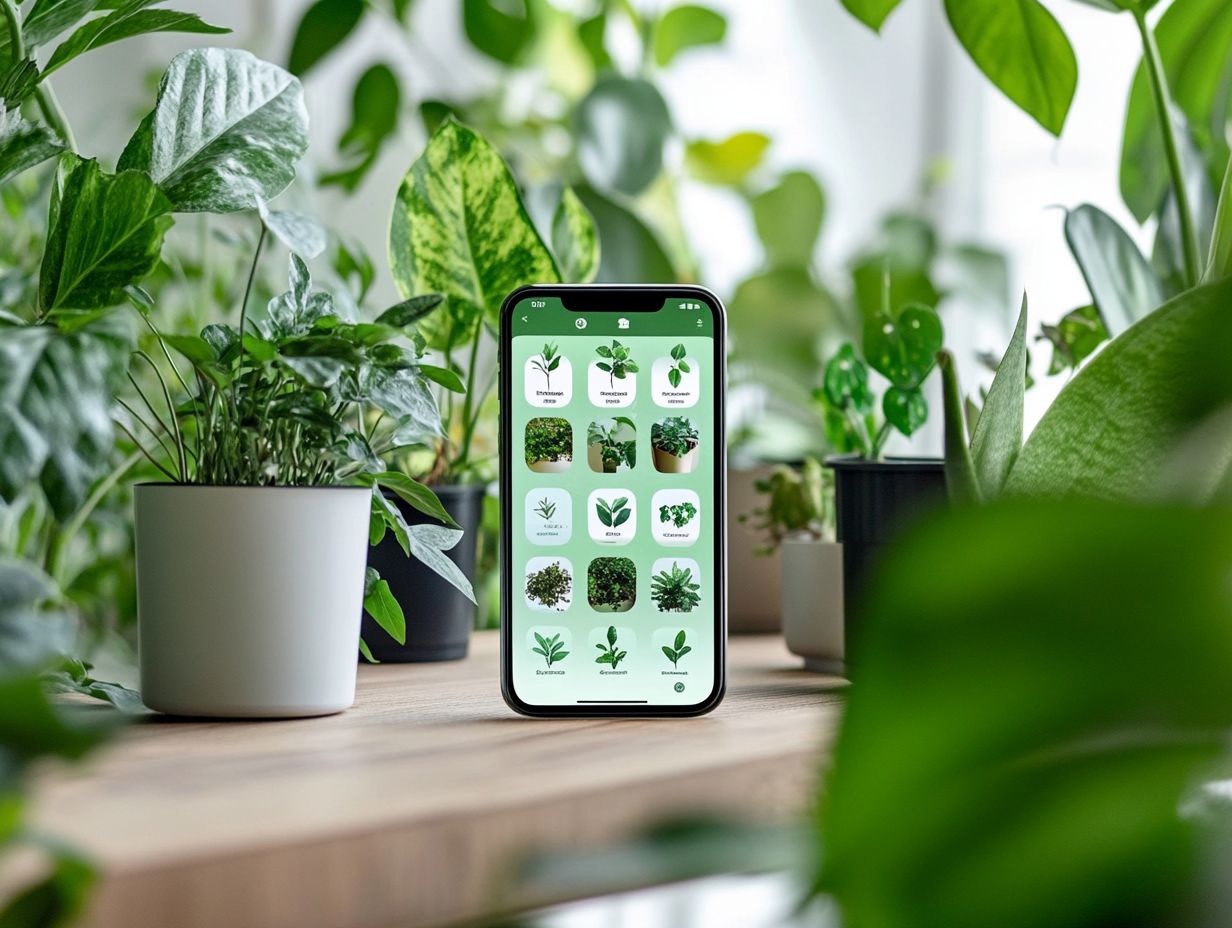
You re likely among the many users seeking free plant identification apps, and you ll be pleased to find a variety of options that deliver essential features without costing a cent. These apps are perfectly tailored for those who desire easy and accurate identification.
These apps often come equipped with handy features like photo recognition, plant care information, and a rich database of species, allowing you to effortlessly explore the flora surrounding you. While the free versions boast impressive functionality, you may encounter some limitations compared to their premium counterparts, such as fewer identification results or the presence of ads.
For the casual plant enthusiast or anyone just beginning their journey into botany, these free apps are an exciting way to start your plant identification journey! You can also use these apps for experiments in your community garden.
What Are the Additional Features of These Apps?
Beyond basic identification, many plant identification apps come packed with features designed to improve your experience. Think of gardening tips, plant care support, and tools for community engagement, all essential for aspiring naturalists.
Some apps offer detailed insights into the optimal growing conditions and seasonal care tailored to your region truly invaluable if you re just getting started with gardening. Others allow you to share photos and insights about your plants, creating a vibrant community where knowledge flows freely.
Certain apps even include handy reminders for watering or fertilizing, which can be a lifesaver if you tend to forget the basics of plant care. These enhancements not only make the identification process enjoyable but also enable you to nurture thriving gardens with a deeper understanding of your green companions.
How Can These Apps Help with Plant Care?
Plant identification apps can be invaluable tools in your quest for effective plant care. They equip you with essential information such as the best times to water your plants, light requirements, and pest management strategies that are crucial for both urban and rural gardening.
These applications not only simplify the care process but also cultivate a vibrant community among gardening enthusiasts. You can share your experiences and tips for specific plants, weaving together a rich tapestry of knowledge that enhances your gardening journey.
Discussion forums within the apps provide a platform for real-time advice. This enables you to troubleshoot any issues with your plants. Such interactions can transform a solitary hobby into a collaborative endeavor, where you inspire others with your successes, share stunning photos of your thriving garden, and exchange innovative ideas to tackle common challenges.
Are There Any Limitations to These Apps?
While plant identification apps present many advantages, it s crucial to know their limits. One major concern is accuracy, particularly regarding reliance on community contributions, including feedback from users.
You may face discrepancies in plant identification due to the varying expertise of users or incomplete information. This can lead to unfortunate misidentifications. These apps often depend on user-submitted photos, which can distort results based on factors like quality or angle.
To navigate these challenges effectively, it s wise to cross-reference your findings with reputable sources or consult online resources that provide detailed information about various plants. Engaging with community forums where seasoned botanists or horticulturists can offer their insights is another excellent approach.
This ultimately enhances your knowledge and boosts your confidence in plant identification. Don’t miss out on the chance to learn from experts in community forums!
How Can Users Contribute to the App’s Database?
You can play an active role in enhancing the databases of plant identification apps by contributing your observations, photographs, and feedback through a mobile interface. This fosters a vibrant sense of community and promotes learning together.
By sharing your findings, you enrich the database and assist fellow nature enthusiasts in accurately identifying various species. For instance, when you upload a picture of a rare flower along with specific habitat details, you provide invaluable data for the app and spark engaging discussions among others eager to expand their knowledge.
Your feedback on misidentified plants can lead to swift corrections, ultimately boosting the app s reliability. Countless examples illustrate how community contributions have directly impacted the accuracy and comprehensiveness of the plant database, showcasing the remarkable power of collaboration.
What Are the Privacy and Security Concerns with These Apps?
Privacy and security concerns have become paramount for those using plant identification apps, especially regarding data collection and sharing personal information.
As these applications gain traction, it s essential to understand how your data is being utilized. Many of these mobile apps collect location data, which might inadvertently reveal your home address or favorite hangout spots.
The terms and conditions often permit data sharing with third parties, which can raise some red flags. Users should also be wary of app permissions.
To enhance your experience and safety, make it a habit to review your privacy settings. Read user reviews regarding an app s data policies and choose those that prioritize your confidentiality.
Opting for apps with strong reputations and transparent practices can significantly bolster the protection of your personal information. Reviews from platforms like Wirecutter and Popular Science can help you make informed decisions about these tools.
Are There Any Similar Apps for Animal Identification?
Much like those handy plant identification apps, various applications dedicated to animal identification offer comparable features. They give you useful tools for exploring the great outdoors. Among these, iNaturalist stands out as a user-friendly option.
These apps help you easily recognize many species, whether it’s a bird elegantly perched on a branch or a mammal making a fleeting appearance. Notable options like Seek and Merlin Bird ID shine for their intuitive interfaces and extensive databases.
While plant identification apps might lean into leaf patterns and flower colors, animal identification tools often harness sound recognition and behavioral cues to enhance your experience.
By using both types of apps, you can immerse yourself in the wonders of nature. You ll gain deeper insights into the intricate relationships between flora and fauna within their ecosystems. Using both apps will take your outdoor adventures to exciting new heights!
Frequently Asked Questions
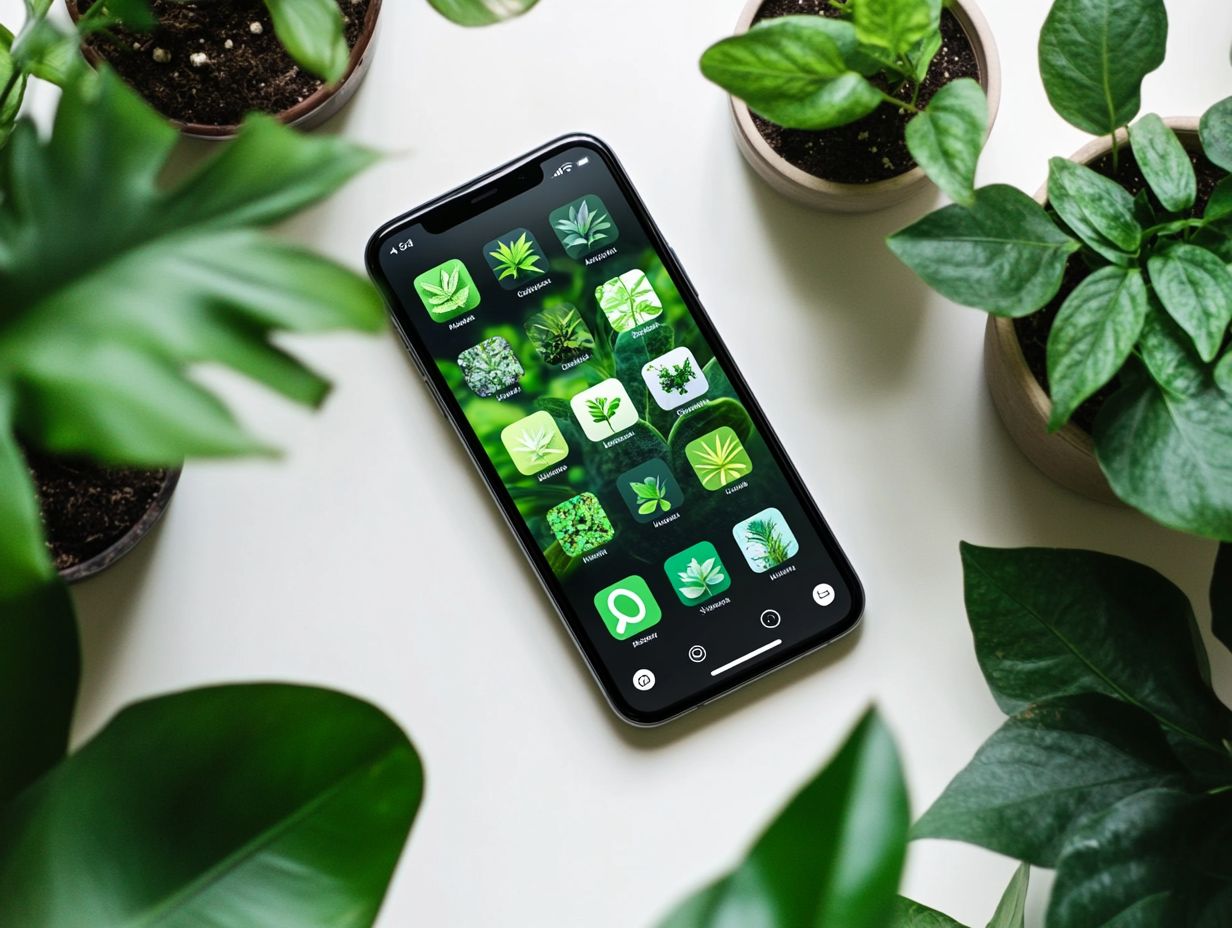
What are the best apps for plant identification?
Some of the best apps for plant identification include PlantSnap, PictureThis, iNaturalist, Garden Answers Plant ID, and PlantNet and Leafsnap.
How do these apps help with plant identification?
These apps use technology that helps identify plants from photos and extensive plant databases to accurately recognize plants.
Can these apps identify all types of plants?
No, they primarily focus on common plants and flowers found in gardens and parks. They may struggle with rare or exotic plants, which can be a concern for avid gardeners and botanical researchers.
Do these apps provide additional information about the identified plants?
Yes, most apps offer details such as plant names, descriptions, care tips, and links to buy plants or related products, enhancing your overall gardening experience.
Are these apps free to use?
Most apps offer a free version with limited features, but users can upgrade to a paid version for more tools and information, making it a simple choice for many.
Can these apps be used offline?
Some apps provide offline functionality, but most require an internet connection to access databases and deliver accurate identification results. This is crucial for users in rural areas where connectivity may be limited.
Download these apps today and start exploring nature like never before!

